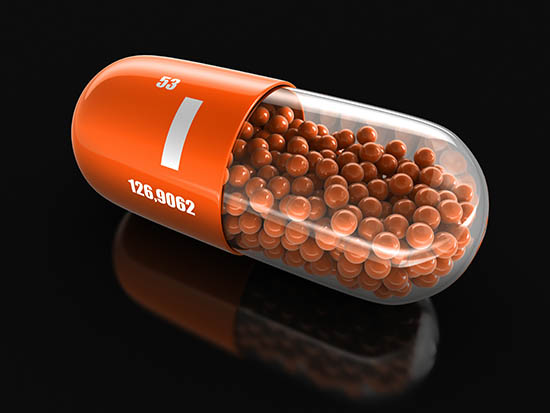
Everyday Chemicals Are Screwing Up Your Testosterone
You may have already read my other article on 7 habits which are killing your testosterone. There was a section in that on Water because

Iodine is a mineral and its best known role is that it helps your body make thyroid hormones. There was a time in the US when the iodine deficiency disease goiters (swollen thyroid gland) was epidemic.
Once manufacturers began adding iodine to salt, goiters mostly disappeared.
However, there is a new epidemic of deficiency, and it’s causing a lot more trouble than goiters.
Iodine was once used to process flour, as a result up to 25 percent of our dietary iodine came from wheat. But manufacturers have since begun using a chemically similar substance called bromide instead (1).
But bromide not only lacks the health benefits of iodine – it can actually block iodine activity in the body.
This is also true for two other common chemicals in our diet; chlorine and fluoride, abundantly found in drinking water (2). There has also been a decades long campaign against eating (mostly iodized) salt.
From 1971 to 2001 iodine intakes in the U.S. dropped by 50 percent (3).
Deficiency has again become a major problem and the drop in iodine consumption could be contributing to many health problems.
According to the Centers for Disease Control and Prevention (CDC) heart disease accounts for 25 percent of all US deaths, and studies find lower levels of iodine increase the risk of heart disease (4).
Think adding iodized salt to your food will help? Think again.
In 2008, researchers worried about the increasing threat of iodine deficiency examined 88 samples of iodized table salt. Less than half of the samples analyzed had amounts of iodine sufficient to maintain health (5).
Other consequences of deficiency are iodine deficiency disorders (IDD), which also significantly affect health (6).
Healthy levels of iodine prevent toxic chemicals such as fluorine, chlorine, and bromine from interfering with thyroid function (7).
We’re exposed to these chemicals every day in our food, water, and especially household chemicals.
Exposure to these chemicals like halogens occurs daily, they’re found in food, water, and household chemicals. Common halogens which can wreak havoc on your body and health include fluorine, chlorine and bromine.
It’s also useful in removing heavy metals, like mercury and lead, from the body and it can even help eliminate the bacteria responsible for peptic ulcers that is also associated with gastrointestinal cancer (8).
Iodine plays a role in boosting immunity and inducing cell apoptosis, the self-destruction of cancerous cells, while sparing healthy cells in the process.
Research shows iodine rich seaweed inhibited the development of breast tumors (9).
Research also shows it protects brain cells from the harmful effects of free radicals by bonding to fatty acids in cell membranes, blocking free radicals to prevent oxidative damage. (10)
Iodine scavenges free radicals and both stimulates and increases the activity of antioxidants throughout your body to provide a strong defense against many diseases.
Proper functioning of your thyroid, glands and hormones triiodothyronine (T3) and thyroxine (T4) requires healthy iodine levels.
Around 48% of iodine stored in your body is stored in your glands (thyroid, testicles, pituitary, etc…) so right off the bat you can see how important iodine is to boost healthy testosterone levels.
I already discussed how halogens have a horrible effect on your body and how iodine can help detox and rid your body of them.
For men, you actually have a halogen receptor in your testicles called “leydig cells” which are responsible for testosterone production within the testicles.
Toxic halogens and iodine directly compete for these receptors and iodine can actually attach to and force excretion of toxic halogens thereby increasing leydig cell functionality. (11)
Thyroid hormones are the body’s way to regulate metabolism; too little and you feel fatigued and gain weight – too much and you’re hyped up and lose too much weight.
But the thyroid hormones do more than that – they help control the growth of hair follicles.
When thyroid hormone levels are too low, the hair follicles can stop regenerating. If the condition is chronic, it can result in significant hair loss (12).
Since iodine is essential for healthy thyroid function, if you’re deficient, you may also experience hair loss.
One study that had 700 participants found that 30 percent of those who had low thyroid hormone levels also were losing their hair (13).
Thyroid hormones are essential to help skin cells regenerate. When thyroid hormone levels are low due to iodine deficiency, the skin won’t regenerate optimally, leading to dry, flaky skin (14).
Thyroid hormones also help your body regulate how well you sweat. If you have lower than optimal thyroid hormone levels, such as occurs with an iodine deficiency, you’ll tend to sweat less if you had normal levels (15,16).
Sweat is one way your skin stays properly hydrated; not sweating enough is a possible reason why dry, flaking skin is a symptom of iodine deficiency.
Being iodine deficient could affect memory and how well you learn (17, 18).
A study of over 1,000 people found that having higher thyroid hormone levels was associated with performing better on both learning and memory tests when compared to those who had lower levels (19).
Thyroid hormones are critical for brain growth and development. So being iodine deficient (which reduces thyroid hormones), severely impacts brain development (20).
Another study found that the part of the brain responsible for long-term memory (hippocampus) was smaller in people that had low thyroid hormone levels (21).
Alpha Wolf Nutrition’s Next Level Superfoods Multivitamin includes an industry leading 252 mcg of iodine from kelp (its premier natural source) in addition to another 400 mg of brown seaweed extract which is another outstanding natural source.
REFERENCES

You may have already read my other article on 7 habits which are killing your testosterone. There was a section in that on Water because

Rhodiola Rosea stands out as a potent adaptogenic herb with a rich history of traditional use and a growing body of scientific research. Revered for

In this comprehensive article, we will explore what L-tyrosine is, its benefits as a pre-workout supplement, the correct dosage, and other potential health benefits it

Betaine anhydrous is becoming an increasingly popular ingredient for pre-workouts. In this article, we will explore the fundamentals of betaine anhydrous, its connection to carnosine,

Beta-alanine is a pre-workout powerhouse. From boosting workout performance to potential anti-aging effects, discover why this amino acid is a favorite among health buffs.

You may have already read my other article on 7 habits which are killing your testosterone. There was a section in that on Water because

Rhodiola Rosea stands out as a potent adaptogenic herb with a rich history of traditional use and a growing body of scientific research. Revered for

In this comprehensive article, we will explore what L-tyrosine is, its benefits as a pre-workout supplement, the correct dosage, and other potential health benefits it
Discount Applied Successfully!
Your savings have been added to the cart.